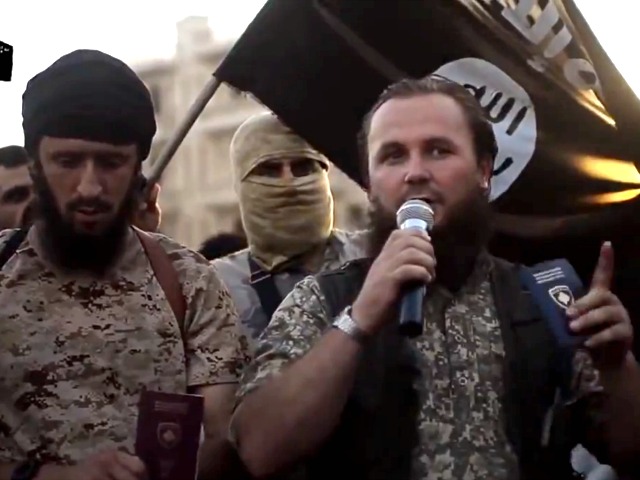
Views: 4440
Bosnia and Kosovo are two of the biggest exporters of jihadists joining the Islamic State (ISIS) and al-Nusra Front (al-Qaeda’s affiliate in Syria) from the Balkans. As The Cipher Brief reported last month, legacies of the Communist era and the wars of the 1990s – presence of foreign fighters, economic and physical destruction, a lack of funding to rebuild, and the near eradication of moderate Islamic institutions – paved the way for Islamic extremist groups to establish a foothold in both countries. Now, ISIS recruiters are targeting Bosnia and Kosovo, and many Bosnians and Kosovars have left to fight in Syria and Iraq.
Bosnia
When war broke out in Bosnia in the early 1990s, the ultra-conservative Sunni Islam movement known as Salafism was brought to Bosnia “by Saudi-sponsored mujahedeen fighters mobilized to fight alongside the drastically under-armed and under-funded Muslim Bosniaks against both Serbs and Croats,” explains Cipher Brief expert Tanja Dramac Jiries. Some of these foreign fighters received citizenship and stayed in Bosnia after the war, says Adrian Shtuni, an expert on violent extremism in the Balkans.
Jiries notes that to day, “Extremist communities [offer] an attractive refuge to young men and women deprived of any opportunity for economic prosperity.”
day, “Extremist communities [offer] an attractive refuge to young men and women deprived of any opportunity for economic prosperity.”
The number of those lacking economic wealth – and potentially turning toward extremist groups for both sociological and monetary reasons – continues to grow in Bosnia. A report released this month by Bosnia-based think tank Social Overview Service finds the Bosnian economic model unsustainable due to “budget deficits that are growing on almost all administrative levels” and a “serious liquidity crisis.” This, according to the report, is delaying salaries, pensions, and social benefits and causing deep unrest within society.
In addition, Bosnia is gearing up for local elections in October, which means polarizing pre-election campaigns have already begun. Jiries explains, “Local and general elections have become the ideal stage for nationalist leaders to not only remind citizens of the dangers that permeate their country, but also to lay out their plans for protecting their respective ethnic community – be it Croat, Serb, or Bosniak.”
Economic instability and radical rhetoric can foment extremist ideology. Indeed Balkan Investigative Reporting Network investigators recently found that since 2012, at least 200 Bosnian men are believed to have fought with jihadi groups in Syria and Iraq. Bosnia’s State Investigation and Protection Agency puts that number at 280 and reports about 120 of those are still fighting with ISIS or al-Nusra Front.
The U.S. State Department, in its recently released 2015 report on terrorism, notes the large number of Bosnians traveling to Syria and Iraq to join terrorist groups. But what may be even more worrying is that 50 Bosnians are believed to have returned home. And Bosnia’s complex security system of 15 different police agencies, the Prosecutor’s Office, and the Court means coordination and intelligence sharing is difficult, if not non-existent.
One positive: The State Department report praises Bosnia’s 2015 Strategy for Preventing and Combating Terrorism, the first of its kind for a Balkan nation. Plus, in April this year, CIA director John Brennan stopped in Sarajevo to discuss this issue of weak intelligence sharing and the problems it poses to fighting terrorism.
Kosovo
Kosovo’s story of extremist Islamic infiltration is similar to Bosnia’s. During the 1998 – 1999 Kosovo war, foreign fighters flocked to the country to participate, although in lesser numbers than in Bosnia. As the conflict came to an end, a handful of Saudi-funded faith-based charities set up shop in Kosovo, a predominantly Muslim nation, says Shtuni. “Besides providing much needed humanitarian aid, building schools, hospitals, orphanages, and community centers, they also erected Wahhabi mosques,” he explains.
Besiana Xharra, a journalist based in Kosovo and a fellow at the Rockefeller Brothers Fund, reports more than a hundred unlicensed mosques sprang up all over Kosovo in a matter of a decade.
Moreover, Shtuni says the Saudi Joint Relief Committee for Kosovo and Chechnya (SJRC) – whose activities have been linked to al-Qaeda – “reportedly built ninety-eight primary and secondary schools in rural Kosovo in the first few years after the war.”
However, Cipher Brief expert Haki Abazi, program director for the Western Balkans at Rockefeller Brothers Fund, notes that institutions such as mosques or schools don’t necessarily mean followers. Saudi efforts to introduce radical Islam into Kosovo, he says, have proved largely unfruitful. “New mosques built by wealthy individuals from Saudi Arabia stand empty. Saudi Arabia’s indoctrination efforts are producing nothing but disappointment for their investors,” he told The Cipher Brief.
Still, according to Cipher Brief expert Anita Rice, the Kosovo government believes at least 300 Kosovars have fought with jihadi groups in Syria and Iraq since 2012, with around 70 still fighting there and 130 who have returned home. And Shtuni claims that among the Balkans and greater European countries, Kosovo has the highest rate of recruitment for violent jihad relative to its population size.
 The country’s economic woes and weak governance do not help. Kosovo has the highest rate of unemployment in the region, and it has been “struggling to establish proper accountable democratic institutions,” says Abazi.
The country’s economic woes and weak governance do not help. Kosovo has the highest rate of unemployment in the region, and it has been “struggling to establish proper accountable democratic institutions,” says Abazi.
Kosovo’s institutions for combatting terrorism – including investigative and prosecutorial apparatuses – remain weak as well. The State Department 2015 terrorism report notes Kosovo has limited capacity, resources, and experience to handle terrorism cases effectively, although Kosovo’s efforts to track and prosecute terror suspects are a positive sign, the report states.
As Bosnia and Kosovo attempt to work through a bloody recent history, the introduction of extremist Islam (especially Saudi-backed), institutional weakness, and economic distress, ISIS and other militant groups have established recruiting efforts within both countries. But the governments and their citizens are fighting back. Abazi points out, “In the last six months, not a single case of recruitment by ISIS or other extremist groups has been recorded in Kosovo.”
That does not mean the international community should believe the issue will fade away without help. Indeed, as Albania’s Former Defense Minister Fatmir Mediu told The Cipher Brief last month, the Balkans will need greater support from the U.S. and the EU in building institutional capacity and regional cooperation.
Originally published on 2016-06-24
About the author: Kaitlin Lavinder is an International Producer with The Cipher Brief.
Source: The Cipher Brief
Origins of images: Facebook, Twitter, Wikimedia, Wikipedia, Flickr, Google, Imageinjection & Pinterest.
Read our Disclaimer/Legal Statement!
Donate to Support Us
We would like to ask you to consider a small donation to help our team keep working. We accept no advertising and rely only on you, our readers, to keep us digging the truth on history, global politics and international relations.










